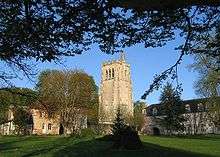Herluin (Abbott of Bec)


Herluin commonly called Hellouin, (995/997 in Bonneville-Aptot-August 26, 1078), was a knight at the court of Gilbert of Brionne and a Benedictine monk who founded Abbey of Our Lady of Bec, Normandy.[2]
Early life
Born around 995/997AD, according to Mabillon, of Norman Nobiulity. Ansgot his father was a Danish Viking follower of Rollo, while his mother, Eloise had kinship to the counts of Flandres. In his youth he was a brave soldier to whom the Duke Robert gave more than a mark of esteem. Later, being poorly paid for his services by Gislbert, Herluin began to take the profession of arms in disgust. One day in 1034, amid a frightful melee where he had hardly any hope of salvation, he vowed to drop the sword and put on the garb of the monks, if escaped so great peril.
Monastic career
He survived and retired as a hermit to settle in one of his fields,[3] about 1041AD.[4] Quickly joined by several companions, he laid the foundation of a monastery. Herbert, Bishop of Lisieux, dedicated 25 March 1034 the chapel built by Herluin and ordained him, head of the small community. In 1034/1035, the Duke granted land and He built the cloister and the monastic buildings and adopted the Rule of St. Benedict.[5]
Bonneville, however, was a place difficult of access, and lacking water. Herluin and the brothers resolved to leave, and about 1039AD settled in Bec down the valley. His students included Lanfranc and St. Anselm, future archbishops of Canterbury.
The monastery experiencing significant growth founded a second church at Bec-Hellouin. William the Conqueror endowed the Abbey, as did his sons.,[6] Students of Herluin at Bec included Pope Alexander II Theobald of Bec, Archbishop of Canterbury, William Good Soul, archbishop of Rouen, Guitmund, bishop of Aversa Arnost of Gundulf, Turold Brémoy, bishop of Bayeux, Yves, bishop of Chartres, Fulk of Dammartin Bishop of Beauvais, Gilbert Crispin, Abbot of Westminster
Herluin died August 26, 1078 at his side was Roger, abbot of Lessay.[7] His funeral was chaired by Gilbert Fitz Osbern, Bishop of Évreux[8] and he was buried in the capitulaire room.[9] The remains of Herluin today can still be seen in today's abbey church, refectory with some documents of his. He is considered blessed and His feast day is August 26.
References
- ↑ Ferdinand Hoefer, Nouvelle Biographie générale, vol.24, (Paris, Firmin-Didot, 1858), p. 348-9.
- ↑ Véronique Gazeau (préf. David Bates et Michel Parisse), Normannia monastica (Xe-XIIe siècle) : II-Prosopography des abbés bénédictins, (Caen, Publications du CRAHM, 2007), (ISBN 978-2-902685-44-8), p. 7-9.
- ↑ François de Beaurepaire, Les noms des communes et anciennes paroisses de l'Eure, (éditions Picard, Paris, 1981), p. 70.
- ↑ Véronique Gazeau (préf. David Bates et Michel Parisse), Normannia monastica (Xe-XIIe siècle) : II-Prosopography des abbés bénédictins, (Caen, Publications du CRAHM, 2007), (ISBN 978-2-902685-44-8), p. 7-9.
- ↑ Véronique Gazeau (préf. David Bates et Michel Parisse), Normannia monastica (Xe-XIIe siècle) : II-Prosopography des abbés bénédictins, (Caen, Publications du CRAHM, 2007), (ISBN 978-2-902685-44-8), p. 7-9.
- ↑ Véronique Gazeau (préf. David Bates et Michel Parisse), Normannia monastica (Xe-XIIe siècle) : II-Prosopography des abbés bénédictins, (Caen, Publications du CRAHM, 2007), (ISBN 978-2-902685-44-8), p. 7-9.
- ↑ Pierre Bouet et François Neveux, Les évêques normands du XIe siècle : Colloque de Cerisy-la-Salle (30 septembre - 3 octobre 1993), (Caen, Presses universitaires de Caen, 1995). (ISBN 2-84133-021-4), ( Les évêques normands de 985 à 1150), p. 19-35.
- ↑ Véronique Gazeau (préf. David Bates et Michel Parisse), Normannia monastica (Xe-XIIe siècle) : II-Prosopography des abbés bénédictins, (Caen, Publications du CRAHM, 2007), (ISBN 978-2-902685-44-8), p. 7-9.
